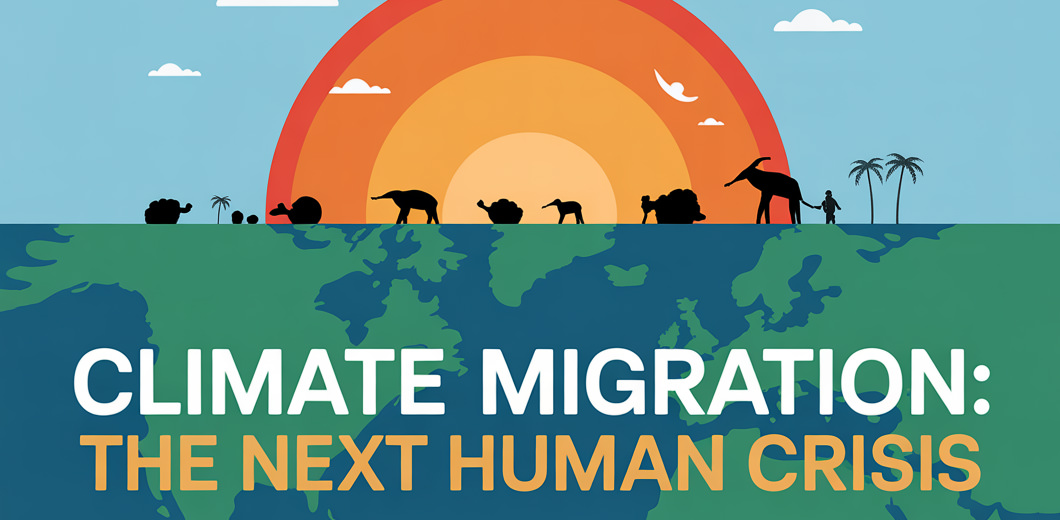What You Need to Know
- 🌊 Rising sea levels and extreme weather events are primary drivers of climate migration, pushing communities to seek safer environments.
- 🌍 Geopolitical tensions are intensifying as countries struggle to manage the influx of climate migrants, impacting international relations and resource distribution.
- 🏙️ Urban areas are adapting to accommodate increasing populations of climate migrants, leading to innovations in urban planning and sustainable infrastructure.
- ⚖️ Current international law lacks provisions for climate refugees, highlighting the need to redefine legal frameworks to protect displaced individuals.
- 🤝 The global community faces the challenge of developing equitable and sustainable solutions to address the complex dynamics of climate-induced migration.
As the planet continues to warm, the phrase “climate migration” is becoming increasingly prevalent in global discussions. While climate change has long been associated with environmental shifts, its impact on human populations is profound. From rising sea levels to severe droughts, environmental changes are displacing millions, pushing them to seek refuge in safer locales. This phenomenon is not only reshaping the demographic landscape but also altering geopolitics, urban planning, and international law. Understanding the dynamics of climate migration is crucial for preparing for this emerging human crisis.
The Forces Driving Climate Migration
Climate migration is primarily driven by extreme weather events and gradual environmental changes. Hurricanes, floods, and wildfires can cause immediate displacement, forcing people to abandon their homes in search of safety. These events are becoming more frequent and intense due to climate change. On the other hand, gradual changes such as rising sea levels and prolonged droughts slowly render areas uninhabitable, pushing populations to relocate.
Regions like the Pacific Islands and parts of Southeast Asia face the existential threat of disappearing entirely beneath rising oceans. Meanwhile, areas in the U.S., such as Florida, are experiencing increased flooding. These forces collectively drive millions to move, creating a complex tapestry of climate-induced migration. Understanding these drivers is essential for formulating effective policies to manage this human movement.
Geopolitical Implications of Displacement
As populations shift, geopolitical tensions are rising. Nations receiving large influxes of climate migrants must grapple with increased demands on resources, housing, and infrastructure. Countries like Bangladesh are already experiencing internal displacement, with millions moving from rural to urban areas due to flooding and erosion.
This migration can strain international relations, particularly if neighboring countries are perceived to be responsible for emissions causing climate change. As climate migration accelerates, it is reshaping geopolitical alliances and sparking debates over responsibility and reparations. Addressing these issues requires international cooperation and a reevaluation of existing geopolitical frameworks to ensure stability and peace.
Urban Planning in the Age of Climate Change
Urban areas are increasingly becoming the destination for climate migrants, necessitating a reevaluation of urban planning. Cities must adapt to accommodate growing populations while mitigating their own environmental impact. This requires innovative solutions such as green infrastructure, improved water management systems, and sustainable housing developments.
For instance, cities like Miami are investing in flood defenses and water management to combat rising sea levels. The challenge lies in balancing immediate needs with long-term sustainability goals. Urban planners must consider climate projections to design resilient cities that can withstand environmental changes while providing safe havens for displaced populations. The integration of climate adaptation into urban planning is not just an option but a necessity.
Redefining International Law for Climate Refugees
Current international law does not adequately address the needs of climate refugees. The 1951 Refugee Convention, for instance, does not recognize environmental factors as valid grounds for refugee status. This legal gap leaves millions without protection or rights under international law.
Efforts are underway to redefine legal frameworks to include climate-induced displacement. The Global Compact for Migration and initiatives by organizations like the United Nations seek to address this oversight. However, progress is slow, and much remains to be done. Developing comprehensive international policies that recognize and protect climate migrants is crucial for safeguarding human rights. The question remains: how can international law evolve to meet the challenges of climate migration?
As climate change continues to influence migration patterns, the world faces a new human crisis. The interplay of extreme weather, geopolitical tensions, urban challenges, and legal gaps creates a complex scenario that demands urgent attention. Preparing for climate migration involves not just understanding its causes and effects, but also developing sustainable and equitable solutions. What steps can global leaders take to ensure a just and effective response to this emerging crisis?
Did you like it?4.6/5 (27)





8 comments
julian
Thanks for highlighting this issue! What role do you think education plays in preparing future generations to tackle climate migration?
Brooklyn
I’m skeptical about politicians handling this crisis. 😅 Do you think grassroots movements could lead the charge in addressing climate migration?
socks
Great post! It’s sad to hear that places like the Pacific Islands might disappear. Are there any success stories where climate migrants have thrived in their new homes?
violet
This is a critical issue! How can we push for more rapid legal changes to accommodate climate migrants? The pace of change seems so slow!
RobertEnchant2
Real talk, if international law doesn’t catch up, what’s stopping countries from just ignoring climate refugees? 😬
RileyWanderlust
I’m curious, how does climate migration impact cultural preservation for those displaced? Does anyone have examples of communities maintaining their traditions post-relocation? 🌍
Piper1
Wow, climate migration sounds like a sci-fi plot! But seriously, how do we ensure that urban areas don’t become overwhelmed by new arrivals?
Noah3
Thanks for this enlightening post! It’s shocking how many communities are being uprooted due to climate change. What can individuals do to support climate migrants in their own countries?